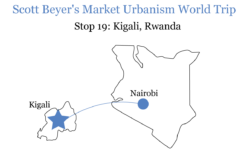Kigali ‘Mototaxis’: Fast, Cheap, Ubiquitous Transport
Residents traverse the Rwandan capital by choosing among 30,000 motorcycle drivers.
In Africa, private car ownership is a luxury – only 45 out of every 1,000 people own one on the continent. People instead rely on informal shared transportation, including the private buses I described in a previous column. But some African cities also have a smaller-scale method, particularly in one city. The Rwandan capital Kigali has a “mototaxi” service full of thousands of motorcyclists picking up passengers for a fee. These bikes are fast, cheap and ubiquitous – in fact, they are the single best mass transport network I’ve ever seen.
How Mototaxis Work
Rwanda has an even lower rate of car ownership than the African norm, with 19 registered cars per 1,000 citizens (compared with 811 per 1,000 in the U.S.). Mototaxi drivers capitalize on this, traversing major cities to find passengers. Like conventional taxis, they operate on-demand and provide door-to-door service (though some claim that picking one up at a staging area is safer), effectively eliminating the first-last mile problem inherent to mass transit.

As with Kenya’s matatu buses, they do so for affordable rates. I found that most rides were under $2. The city also has more conventional buses, but they’re slower and less reliable. One rider told local media that a trip taking two hours by bus can take 20 minutes by mototaxi, and that he has come to employ one driver consistently, an option that many others use.


In the above photo, bus riders leave a crowded terminal in southside Kigali. In the photo beneath, mototaxis sit right outside the terminal, looking to solve the riders’ last-mile problems.
There are an estimated 45,000 commercial mototaxis in Rwanda, with up to 30,000 in Kigali alone. While visiting, I found they were the ultimate in transportation convenience: stepping from my hotel, I could hail one at any time of day in under 2 minutes (although I eventually found an individual who would pick me up on-demand when I messaged him on WhatsApp).
While 3rd World motorcyclists often work in food delivery, mototaxis are an Africa thing, as I found them also in Kenya, Tanzania and Sao Tome. Autodesk claims that there are 3 million mototaxis across East Africa alone.
Modernization
There have been some attempts to introduce Uber-like app-based business models to mototaxis. Yego Moto, launched in 2016, provides rides with standard rates (as opposed to ones negotiated on site between driver and rider). The company has adapted the Uber business model to Kigali; for instance, addressing low internet access by running a call center. National Geographic reports that another such company, SafeMoto, wants to improve safety standards, given that 80% of crashes in Rwanda are caused by motorcycles.
But some local observers are skeptical of these firms’ long term viability; as a motorcycle wash owner put it, “[an] app company would take too high a proportion of the modest fare.” Indeed, one Yego Moto driver commented that some riders prefer to bargain.
Regulation
Kigali mototaxis appeared, unlike elsewhere in Africa, to have some level of standardization. Drivers rode similar-looking bikes and had the same color helmets, while also carrying helmets for passengers. SafeMoto has its own standards, with green helmets and red- and silver-colored bikes. Generally, mototaxi operators take part in “cooperatives” which function as bargaining units and enable individual drivers to become owner-operators by purchasing bikes.
The government has reduced some costs to mototaxi operators: the annual operating fees were waived in late 2022, and recently the government announced a reduction in insurance costs for drivers. But in other ways, the regulatory regime around mototaxis may be growing – and the cooperatives play a role. For instance, the government has some degree of power over the cooperatives and sets caps to prices (though given how ubiquitous the bikes are, and how much haggling occurs, it’s unclear how enforceable those rules are). In 2020, authorities required mototaxis to have modernized meters, and Yego Moto’s affiliate is the sole company authorized to install them. The switch was criticized by some riders concerned about price increases.
There are also efforts to promote electric vehicle use to combat pollution, and the government aims to move all mototaxis over to electric propulsion. According to the BBC, so far the Rwandan government has prioritized measures like exclusive lanes for EVs over bans – i.e. the carrot over stick approach. Ampersand, a Rwandan motorcycle manufacturing firm, looks to fully transition its vehicles to electric, claiming that the power cost savings will increase revenue.
*
There are many takeaways from the mototaxi systems in Kigali and other African cities. They offer yet another example of how effective minimally-regulated, spontaneous transport services can be. They show that transit networks can be lean and don’t always need heavy physical infrastructure such as buses, trains, shelters, and stations, etc. And they speak to an attitude shift that could occur in Western cities. People in New York and Chicago would find it odd to hop on the back of someone’s motorcycle, and I was weirded out when first trying it. But after seeing how cheap and efficient it was, mototaxis, where available, have now become my mode of choice.
All images credited to Scott Beyer and The Market Urbanist.
Catalyst articles by Scott Beyer | Full Biography and Publications
